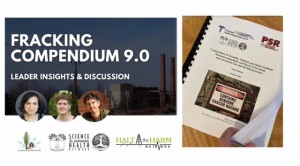From Ryan Clover, Halt The Harm Network, 11/3/23
The replay is now available – Leader Insights on the Fracking Science Compendium 9.0 ~ which we aired on November 1st at 2 PM via Zoom. This is an unusually informative Zoom program since it provides significant insight into the technical literature on the nations fracking challenges AND an opportunity is meet someone directly affected by this industry.
NOTE ~ Watch the replay on HHN, https://youtu.be/necL4WgvvWk
Thanks to Sandra Steingraber and Ranjana Bhandari for joining us and sharing your insights on how the compendium can be used for advocacy.
Next week we’re hosting the virtual live-stream for the 2023 Sentinel Awards with FracTracker Alliance. You can register here: https://lu.ma/2023-sentinel-awards
Let’s be in touch! You can create a profile in HHN to connect with other leaders, view our full recording library, and see upcoming events.
>>> Best, Ryan Clover, Halt the Harm Network
#######+++++++#######+++++++#######
SEE ALSO ~ “Explaining the Halliburton Loophole (Fracking Chemicals and Our Water Supply”
According to one study, over 18 million Americans now live within a mile of an oil or gas well. And since about 2014, most of those new oil and gas wells have been fracked. Low income communities and communities of color are disproportionately affected. As one study recently showed the sighting of these oil and gas wells often relates to the geographies of historic redlining.
Yet there are no federal level disclosure or monitoring requirements for fracking. This is in part because of a suite of federal exemptions passed over the last few decades. Fracking isn’t exempt from part or all of The following, the Clean Water Act, the Clean Air Act, the National Environmental Policy Act, and a range of hazardous waste and community right to know laws like CERCLA, EPCRA, and RCRA.
It’s also exempted from the Safe Drinking Water Act, which is the only legislation that sets out legally binding drinking water standards at the federal level.
It also establishes the guidelines for regulating underground injection of chemicals called UIC guidelines, which require monitoring plans, among other protections. And many of these things I’m sure you already know, but I’ll give the brief context before we move forward. After extensive lobbying by the oil and gas industry, oil and gas activity was exempted from the Safe Drinking Water Act under the 2005 Energy Policy Act.
This provision is often called the Halliburton loophole because it’s named after then Vice President Dick Cheney, who was the former CEO of Halliburton and really championed that lobbying process. So the Halliburton loophole now means that chemicals whose use would otherwise be regulated by the Safe Drinking Water Act are now legally allowed to be injected as part of fracking activity.
In addition, oil and gas producers are not required to develop underground injection control plans, they’re not required to disclose the contents of fracking fluid, and they’re not required to monitor local water sources for contamination under the Safe Drinking Water Act.

